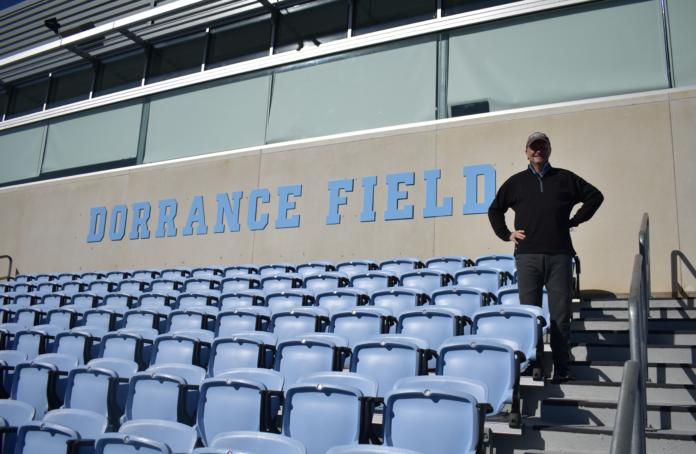
After 43 years of service to the University of North Carolina at Chapel Hill, Anson Dorrance received the honor of having the new women’s soccer field, formerly known as Fetzer Field, named Dorrance Field. The honor was bestowed upon the women’s soccer coach before the Tar Heels’ home game against Notre Dame on September 29.
Through 21 national championships, 22 ACC tournament and regular season championships, one women’s World Cup championship, eight national coach of the year awards, ten ACC coach of the year awards, and an overall coaching record eclipsing 1,000 wins, Dorrance has certainly earned the honor.
The father of three children who went through Chapel Hill High School, Dorrance has an indissoluble connection to the town and appreciates what Chapel Hill has offered him and his family.
Continue reading for an exclusive interview with the National Soccer Hall of Fame inductee.
What made you want to come back as a coach after playing at UNC?
It fell in my lap—I had no ambitions to coach. I finished my playing career at UNC, got married the summer I graduated and moved to Chapel Hill with the ambition of going to law school. My dad was an oil businessman. He was starting his own company, and the family humor is that, if I got a law degree and worked for him, at least I wouldn’t have the tendency to steal from my own estate. I love my father, and I was a dutiful son. As soon as I was admitted to law school, I went and the coach I was playing for at UNC, a wonderful man by the name of Dr. Marvin Allen, was retiring. He basically went in and suggested to our athletic director at the time, a gentleman by the name of Bill Cobey, to hire me and be his successor. [Allen] was a part-time soccer coach and a full time physical education instructor at the university. Cobey took him up on that and, he offered me the job. I was thinking, “This is great; this will help me pay my way through law school,” but I still had no ambition to coach. I was just doing it for income. Usually it takes you three years to get your law degree, but I was going into my fourth year because I was one course shy each semester in order to coach. As I was finishing up my law degree in the fourth year, they gave me the women’s team to coach and made a part-time men’s position full time, so I was coaching the men and the women and going to law school. It was overwhelming, so I dropped out of law school just to coach, and, by this time, I had fallen in love with coaching—that’s that story, I guess.
You originally coached the men’s soccer team; how did you become the head coach of UNC’s women’s team?
I had coached the first three years while I was in law school; I was just coaching the men. In my fourth year of law school, they gave me the women, and then I coached men and women for ten years together, and I was also coaching the United States national team. Obviously, coaching two teams collegiately is too much, and then, when they gave me the national team, it certainly made it even worse. I went in and asked the athletic director to, if possible, split the program. By this time, I had negotiated with my men’s assistant, a wonderful man by the name of Elmar Bolowich, that the only way we were going to push this through—for him to end up coaching the men and for me to coach the women—was to make a proposal that would be economically feasible for the athletic department. We had 28 sports but not really enough money to support them all, so the last thing my athletic director would have wanted was to split the program and hire two head coaches with enormous budgets. We went in and negotiated with the athletic director at the time, a gentleman by the name of John Swofford, now the commissioner of the ACC. We basically said, “We gotta split it; it’s hurting us in recruiting, so let’s do this. Let’s split the program in half.” Elmar, my men’s assistant, agreed to be the men’s head coach on an assistant coach’s salary. Once we checked all those boxes, the athletic director had no trouble with it. The program was split and my last year coaching the men and women was 1988. From 1989 forward, I just coached the women. Of course, I was still coaching the women’s national team—I continued coaching that until 1994.
How were your three children’s experiences going through Chapel Hill High School?
Chapel Hill High is a wonderful school, very good academically, so they all got a wonderful education. My eldest daughter [Michelle], because she wanted to be a professional dancer, ended up going to New York University to obviously get her degree, but also to be in a city that had a vibrant dance community. My middle daughter [Natalie] came to UNC, and so did my son, which obviously I’m incredibly proud of because I love my university. They all went to fine schools and gained wonderful educations. Now, my eldest daughter [Michelle] is considered one of the greatest tap dancers of all time. She has her own dance company; she won a MacArthur “Genius Grant” for dance, and she hired my son to be her musical director, so they live in New York together, and they both basically run Dorrance Dance in New York. My middle daughter [Natalie] married a litigating attorney—they live in Greensboro, and they have three grandkids of mine. That’s the family.
What is your proudest moment of your eldest daughter, Michelle?
What I loved about Michelle in high school is the fact that she tried to do everything. She continued her dance training, but she also continued to try and play soccer, which I thought was great and continued to do well enough academically to be admitted to a great school like New York University. Obviously she was playing soccer because her dad was a soccer coach, and I’m even proud of the fact that she played one year of collegiate soccer at NYU. What was cool about that was that NYU doesn’t even have a field. They would have to jump in vans to drive to Central Park to practice, and it was very, very difficult. I’m proud of the fact that she played soccer while she was developing her dance shops and played at least one year of collegiate soccer while she was attending this great university and obviously studying hard enough to do incredibly well.
Did Natalie or Donovan play soccer through school?
Natalie played high school ball. Donovan played soccer through middle school. Actually we continue to play: every time we get together over the summer, there’s beach soccer where all the Dorrance kids and any other kids we can recruit from the beach and Natalie’s husband—who’s a very good athlete—and their ten year old all jump out there and try to play a bit. It’s fun, and I certainly look forward to it every summer. It’s certainly one of our first choices for recreation, so I love the fact that my kids are still playing the game that I absolutely love.
How do you feel Chapel Hill was as a place for your kids to grow up in?
Chapel Hill is a very cosmopolitan community, despite the fact that it’s a village. It’s incredibly impressive what Emil Kang has done for Memorial Hall—the caliber of the artists that he brings in who inspire the local community in the most positive way. I have a lot of respect for Emil and what he’s done, and I’m sure that his extraordinary vision and the caliber of companies, musicians, dancers and different groups that he brought into Memorial Hall had very powerful influences on certainly both my children who are now professional artists. I think this town itself—and certainly Emil and the University of North Carolina—had huge influences in inspiring the two kids who are still actively artists. From that perspective, it’s such a privilege for all of us to live here in Chapel Hill, given this great university and the people who make it extraordinary. I am forever grateful that I live in this wonderful town.
How does it feel to have the stadium named after you?
Well, it’s just so wonderfully flattering to have the board of trustees, the chancellor, my athletic director, and also the donor who supported it being named after me—to have all those different influences blend together to make that decision—it’s just a wonderful statement about being appreciated. As anyone will tell you, I am a proud son of the University of North Carolina, and I know the cliche about Chapel Hill—it’s the Southern part of heaven—but to have a piece of heaven named after you is an extraordinary feeling. It was like I had died and I was still attending my own funeral. The eulogies that were given at those two functions were extraordinary. It’s something I’ll never forget.
Is there anything else you want to accomplish before you retire?
My work isn’t really done at UNC. They’ve built me this beautiful stadium, so now what I’d love to do is find a way to fill it. We filled it against Duke, and we had a good crowd against FSU, but we have to figure out how to fill it regardless of who we’re playing against. That’s the next challenge. Certainly in this era of equal pay, a part of the formula for equal pay is to have people buy tickets to watch women’s sports. That’s the ambition now, certainly now with the ACC Network as an important partner for our profile and the culture of women’s athletics, but still we have to do the difficult work of getting people to come watch every single game. There’s a lot of work for us to do in that area. I’m excited about that challenge while we continue to try to recruit elite athletes whom we can try to develop to play for not only World Cups and gold medals, but also for championships. We won the regular season championship this year and we’d love to win the ACC tournament [note—the Tar Heels defeated Virginia 2-1 in the championship match four days after the interview was conducted] and we’d certainly like to continue to compete for national championships. That part of it never gets old, and neither does player development.
How much longer do you intend to coach for?
I signed a five-year contract last summer with UNC, and I will certainly honor that. Nike has put us in a position where I can stay with them for the next ten years, so somewhere between five and ten years will be the extent of my collegiate coaching.











